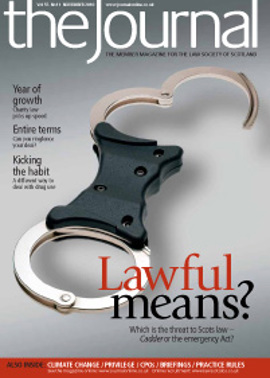First registered paralegals confirmed
The Society's newly launched Registered Paralegal Scheme has seen more than 130 initial applications from those wishing to become the first registered parlegals in Scotland.
The first phase of the scheme, which was launched in August in association with the Scottish Paralegal Association (SPA), ran until 15 November to allow highly qualified members of the SPA and other bodies including the Society of Specialist Paralegals and Society of Law Accountants in Scotland to apply to be "grandfathered" into the scheme.
The second entry stage runs from 16 November 2010 to 15 August 2011 and invites applications from those who may not be members of a paralegal body but who may meet the required standard, and thereby obtain a waiver from the requirement to follow the full route which includes a year-long training period. Each case will be considered on its own merits.
The full route, which will be standard from 16 August 2011, will require paralegals to join as a trainee registered paralegal for one year and work with their supervising solicitor to successfully complete the training period before qualifying as a registered paralegal.
Registered paralegals will work in a defined legal domain, or domains, in support of a supervising solicitor in delivering legal advice to clients. Five legal domains have been created so far in the areas of civil litigation: debt recovery; residential conveyancing; wills and executries; criminal litigation; and liquor licensing.
The Registered Paralegal Standing Committee, which oversees applications for entry, will authorise the creation of new legal domains where the market demands it.
Committee convener, solicitor Douglas Russell, said: "Paralegals themselves, in law firms and other organisations, will benefit from having a clearly defined role with recognised skills and knowledge within their particular legal domains and it will also offer them a distinct career path.
"However, almost more importantly, the scheme sets a recognisable standard for the solicitors who employ them and for the client who is seeking legal advice and services, as it will provide certainty as to the minimum level of knowledge, skills, attitudes and values possessed by a registered paralegal."
He added: "Solicitors are central to the scheme as they remain responsible for the work of their paralegals. It's important to recognise this, particularly when the full entry route to becoming a registered paralegal is introduced next August. The trainee registered paralegal and their supervising solicitor must work together to ensure that the paralegal can fulfil the requirements of the training period and ultimately qualify as a registered paralegal."
The Society will continue to evaluate the Registered Paralegal Scheme as it evolves. Further information about the scheme can be found on the Society's website.
In this issue
- In the wee small hours
- Keeping the law in line
- Only a civil matter?
- Mapping the future
- Rights under question
- What help?
- Shunned lifelines
- The whole deal
- The limits of privilege
- Drugs: a user issue
- Law reform update
- Constitution out for views again
- Tackling bullying and harassment
- First registered paralegals confirmed
- Mediation lawyers can apply
- Look out for the rules reviews
- From the Brussels office
- Are they being served?
- Ask Ash
- Paper, pixel and process
- Check yourself
- Call for restraint
- A step back from compensation?
- Key to compliance
- Website review
- Resource issue
- Book reviews
- Stand up and be counted
- Cool drafting
- Partners in purchase






